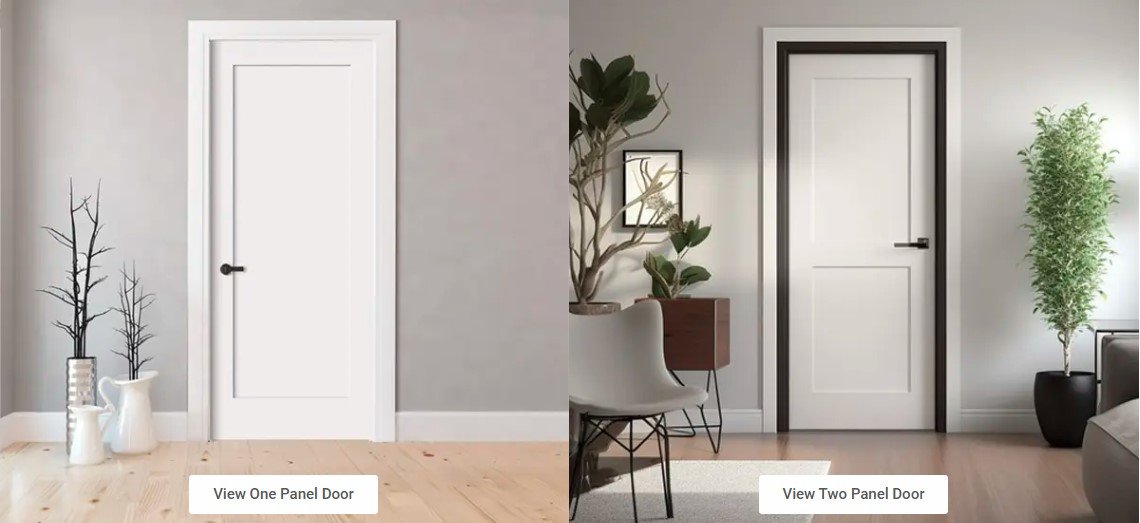
When choosing interior doors for your home or commercial space, safety, durability, and functionality are key considerations. Two popular options that offer enhanced performance are fire-rated interior doors and solid core doors. While both provide advantages over standard hollow-core doors, they serve different purposes.
In this comprehensive guide, we’ll explore:
-
What Are Fire-Rated Interior Doors?
-
Benefits of Fire-Rated Doors
-
Common Applications
-
What Are Solid Core Doors?
-
Advantages of Solid Core Doors
-
Best Uses for Solid Core Doors
-
Key Differences Between Fire-Rated and Solid Core Doors
-
How to Choose the Right Door for Your Needs
By the end, you’ll know whether a fire-rated door, solid core door, or both are the best fit for your project.
What Are Fire-Rated Interior Doors?
Fire-rated interior doors are specially designed to resist fire and smoke for a specified period, typically 20, 45, 60, or 90 minutes. These doors are constructed with fire-resistant materials such as:
-
Mineral cores (gypsum, vermiculite)
-
Steel or fire-rated glass
-
Intumescent seals (expand under heat to block smoke)
How Are Fire-Rated Doors Tested?
Fire-rated doors undergo rigorous testing (e.g., ASTM E119 or UL 10C) to ensure they meet safety standards. They are rated based on how long they can withstand fire exposure while maintaining structural integrity.
Benefits of Fire-Rated Interior Doors
1. Life-Saving Protection
-
Slows the spread of fire, giving occupants more time to evacuate.
-
Prevents smoke from spreading, reducing inhalation risks.
2. Code Compliance
-
Required by building codes in commercial buildings, multi-family homes, and certain residential areas.
-
Often mandated for garage-to-house doors, stairwells, and mechanical rooms.
3. Enhanced Security
-
Thicker and heavier than standard doors, making them more resistant to forced entry.
4. Noise Reduction
-
Provides better sound insulation than hollow-core doors.
5. Durability
-
Built to last longer than standard doors, reducing replacement costs.
Common Applications of Fire-Rated Doors
✔ Commercial Buildings (offices, hospitals, schools)
✔ Apartment Complexes & Condos (hallways, stairwells)
✔ Residential Homes (garage entries, basements, utility rooms)
✔ Industrial Facilities (server rooms, storage areas with flammable materials)
What Are Solid Core Doors?
Solid core doors are constructed with a dense inner core (usually wood composite, MDF, or particleboard) and a veneer or laminate exterior. Unlike hollow-core doors, they offer better durability, soundproofing, and insulation.
Key Features of Solid Core Doors:
-
Heavier and sturdier than hollow-core doors
-
More soundproof (ideal for bedrooms, offices)
-
Better insulation (helps with temperature control)
-
Not fire-rated unless specifically treated
Advantages of Solid Core Doors
1. Superior Soundproofing
-
Reduces noise transfer between rooms, making them ideal for home offices, bedrooms, and media rooms.
2. Increased Durability
-
Less prone to dents and damage compared to hollow-core doors.
3. Enhanced Security
-
Harder to break through than hollow doors, improving home safety.
4. Better Insulation
-
Helps maintain room temperature, reducing energy costs.
5. Aesthetic Flexibility
-
Available in various finishes (wood, laminate, painted) to match any décor.
Best Uses for Solid Core Doors
✔ Bedrooms (for privacy and noise reduction)
✔ Home Offices & Libraries (minimizes distractions)
✔ Bathrooms (better moisture resistance than hollow-core doors)
✔ Main Entryways (more secure than hollow-core alternatives)
Key Differences Between Fire-Rated and Solid Core Doors
| Feature | Fire-Rated Doors | Solid Core Doors |
|---|---|---|
| Primary Purpose | Fire & smoke resistance | Soundproofing & durability |
| Core Material | Mineral, steel, or fire-resistant glass | Wood composite, MDF |
| Fire Resistance | Yes (20-90+ minutes) | No (unless specially treated) |
| Soundproofing | Good | Excellent |
| Weight | Very heavy | Heavy (but lighter than fire-rated) |
| Cost | Higher (due to specialized materials) | Moderate (more affordable than fire-rated) |
| Building Code Requirement | Often required in commercial & multi-family buildings | Not required, but preferred for quality |
How to Choose the Right Door for Your Needs
When to Choose a Fire-Rated Door:
-
Building codes require it (e.g., garage entry, apartment hallways).
-
You need extra fire protection (e.g., kitchen, furnace room).
-
You want maximum security and durability.
When to Choose a Solid Core Door:
-
You need better sound insulation (e.g., bedrooms, offices).
-
You want a high-quality, long-lasting interior door.
-
You prefer a more affordable upgrade over hollow-core doors.
Can a Door Be Both Fire-Rated and Solid Core?
Yes! Some doors combine solid core construction with fire-resistant materials, offering both soundproofing and fire protection. These are ideal for high-end residential and commercial projects.
Final Thoughts: Which Door Is Right for You?
-
Fire-rated doors are essential for safety and compliance in commercial spaces and certain residential areas.
-
Solid core doors are perfect for homeowners seeking durability, noise reduction, and a premium feel.
If you’re still unsure, consult a door specialist or contractor to determine the best option for your specific needs.


